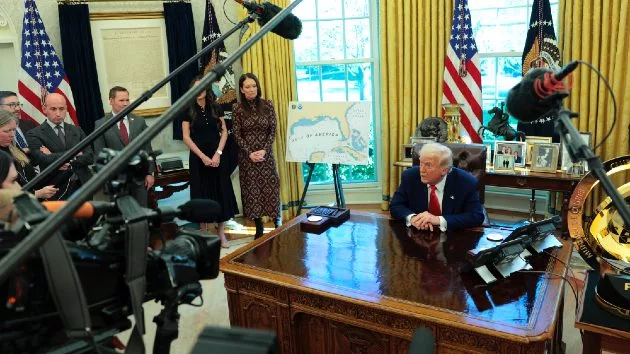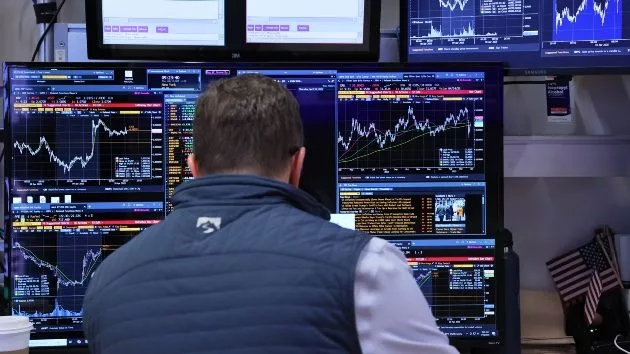
(WASHINGTON) — President Donald Trump’s decision to pause so-called “reciprocal tariffs” for most countries triggered a historic stock market rally on Wednesday, but the levies that remain in place are still expected to hike prices and put the U.S. at risk of a recession, experts told ABC News.
Alongside the suspension of some tariffs, Trump increased duties on Chinese goods to a total of 145%, marking a significant escalation of a trade war between the two largest economies in the world.
Stock markets plunged on Thursday as investors digested Trump’s tariff announcement, slashing roughly half of the previous day’s rally.
The high tariffs on China, the third-largest U.S. trade partner, are expected to raise prices for an array of widely used products, including smartphones, shoes, clothes and video game systems, experts said.
Plus, experts added, the extra costs for U.S. shoppers and a general sense of policy uncertainty increases the likelihood of an economic downturn.
“China is not the only country we trade with but they are an important trading partner for a lot of goods,” Christopher Conlon, a professor of economics at New York University who studies trade, told ABC News.
Even after Trump paused some tariffs, U.S. consumers face an average effective tariff rate of 25.2%, the highest since 1909, the Yale Budget Lab found in report on Thursday. An effective tariff rate factors in the impact of tariffs on imports of finished goods as well as inputs used by domestic firms.
In addition to the tariffs on Chinese goods, the White House kept in place an across-the-board tariff of 10% on nearly all imports. The U.S. also continues to impose 25% levies on foreign autos, aluminum and steel.
Goods from Mexico and Canada face tariffs of 25%, though the measure excludes products covered under the United States-Mexico-Canada Agreement, or USMCA.
Current tariffs are expected to hike prices by an additional 2.7% in 2025, costing consumers on average about $4,400 per household over that time, the Yale Budget Lab said.
“Higher tariffs will push prices up significantly over the next year or so,” Preston Caldwell, chief U.S. economist at Morningstar, told ABC News in a statement on Thursday.
On Thursday, the White House said U.S. tariffs on China stand at 145%, more than the 125% levy that had been widely reported a day earlier.
At the previous tariff level of 125% for Chinese goods, the cost of a nearly $60 car seat would’ve increased an average of $132.75 for a new price of about $192, according to the left-leaning Center for American Progress, or CAP. A Playstation 5 video game system, meanwhile, would’ve increased $623.75 for a new price of roughly $1,122, CAP found.
Under the current 145% tariffs, those price increases would rise further.
Smartphone prices are also expected to rise, experts said. China accounted for more than four of every five of smartphones imported into the U.S. last year, S&P Global said in a note to clients on Thursday.
Experts told ABC News they anticipate price hikes will coincide with an elevated risk of a recession.
They pointed to risks of a slowdown for businesses mired in higher tax costs, as well as a shopping slump as consumers curtail spending to pad their savings to help weather price increases and a possible economic downturn.
“It was encouraging to see the President reverse himself on the so-called “reciprocal” tariffs yesterday, but I wouldn’t take much solace in it as the global trade war continues to rage,” Mark Zandi, chief economist at Moody’s Analytics, said in a post on X. “I still put the odds of a recession this year at 60%.”
The view echoed a note J.P.Morgan sent to clients hours after Trump’s tariff pause on Wednesday.
“The drag from trade policy is likely to be somewhat less than before, and thus the prospect of a recession is a closer call,” J.P.Morgan said. “However, we still think a contraction in real activity later this year is more likely than not.”
For now, the economy remains in solid shape by several key measures.
The unemployment rate stands at a historically low level. Meanwhile, inflation cooled in March, putting price increases well below a peak attained in 2022, fresh data on Thursday showed.
Meanwhile, hiring surged in March, blowing past economists’ expectations and accelerating job growth from the previous month.
Conlon, of New York University, said the likelihood of a recession eased after Trump’s tariff pause but the risk of a downturn remains elevated.
“A lot of the permanent disruption and damage has been done, mostly because you’ll see consumers and companies react to this uncertainty by pulling back,” Conlon said. “People will be way less likely to go out and make big-ticket purchases because of recession fears and that can be self-perpetuating.”
Copyright © 2025, ABC Audio. All rights reserved.



